翻译理论(汉译英)
- 格式:ppt
- 大小:2.58 MB
- 文档页数:117
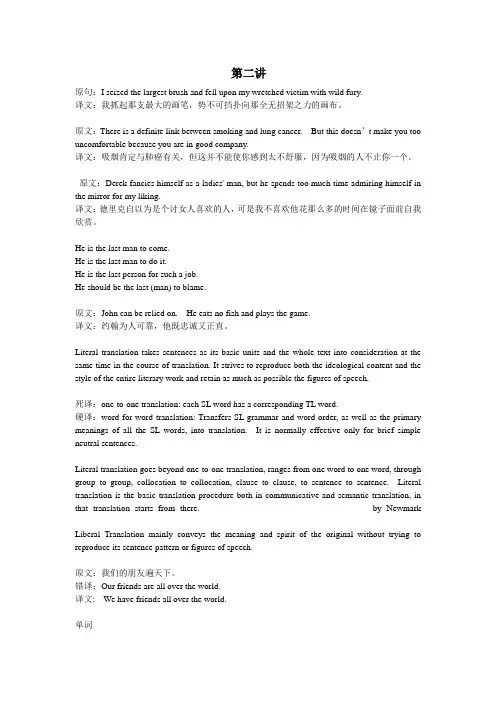
![翻译理论与实践[汉译英]汉译英-长句的处理](https://uimg.taocdn.com/78a60c69f01dc281e53af0bd.webp)
长句的处理Ⅰ. Put the following long sentences into English, paying attention to their structures.1.我厂生产的112升和145升电冰箱,造型美观,质量可靠,噪音小,耗电少,使用方便安全。
2.当前我们迫切需要有一个装备优良、人员齐备、按照安全保护原则、本着一丝不苟的精神建立起来的先进核能实验室。
3.本厂已有35年生产丝绸服装的历史,其产品远销全球50多个国家和地区。
完全真丝,质量上乘,做工精细,款式新颖,光滑柔和,耐洗耐晒,永不褪色,舒适高雅,女士必备。
如欲购买,尽快联系。
4.本厂产品质量稳定可靠,深受用户欢迎。
从1979年以来,获纺织部和省市奖的产品共达84种。
我们将遵循“质量第一”、“用户至上”的原则,热忱地为用户服务。
5.知识分子是工人阶级中掌握科学文化知识较多的一部分,在改革开放和现代化建设中有着特殊重要的作用。
能不能充分发挥广大知识分子的才能,很大程度上决定着我们民族的盛衰和现代化建设的进程。
6.历史业也已证明,人类对资源的认识、开发和利用的,以及制造生产工具利用资源的能力,是社会生产力发展水平的重要标志,也在一定的程度上决定了一定的社会基本结构和发展形态。
7.信息技术是在微电子、计算机和现代通讯技术基础上发展起来的一门高科技,具有信息采集、传输、处理和信息服务等一系列功能。
现今已能在一片8英寸的芯片上集成5亿个电子元件,其宽度仅为0.2503微米;微机的信息处理速度已达每秒近亿次以上;计算机虚拟技术将大大拓宽信息技术应用的范围。
8.提高我国的科技水平,必须坚持独立自主、自力更生的方针。
但是,独立自主不是闭关自守,自力更生不是盲目排外。
科学技术是人类共同创造的财富。
我们不仅因为今天科技落后才需要向外股学习,即使我们的科学技术赶上了世界先进水平,也还要学习人家的长处。
Key: 1.将“造型美观,质量可靠,噪音小,耗电少,使用方便安全”用一个主谓结构译出。
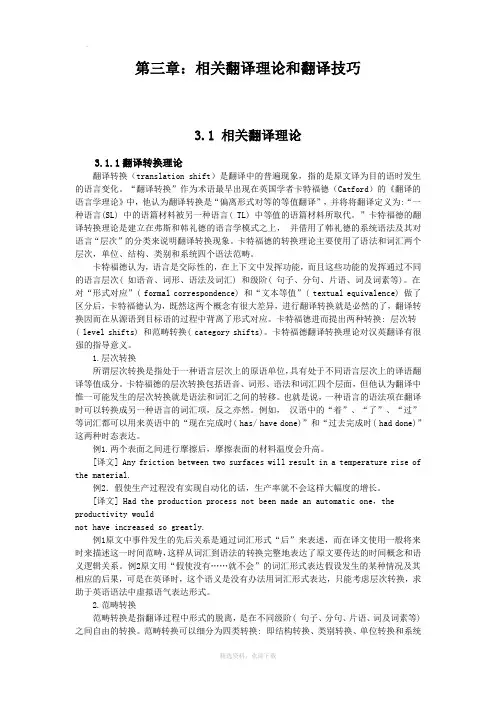
第三章:相关翻译理论和翻译技巧3.1 相关翻译理论3.1.1翻译转换理论翻译转换(translation shift)是翻译中的普遍现象,指的是原文译为目的语时发生的语言变化。
“翻译转换”作为术语最早出现在英国学者卡特福德(Catford)的《翻译的语言学理论》中,他认为翻译转换是“偏离形式对等的等值翻译”,并将将翻译定义为:“一种语言(SL) 中的语篇材料被另一种语言( TL) 中等值的语篇材料所取代。
”卡特福德的翻译转换理论是建立在弗斯和韩礼德的语言学模式之上,并借用了韩礼德的系统语法及其对语言“层次”的分类来说明翻译转换现象。
卡特福德的转换理论主要使用了语法和词汇两个层次,单位、结构、类别和系统四个语法范畴。
卡特福德认为,语言是交际性的,在上下文中发挥功能,而且这些功能的发挥通过不同的语言层次( 如语音、词形、语法及词汇) 和级阶( 句子、分句、片语、词及词素等)。
在对“形式对应”( formal correspondence) 和“文本等值”( textual equivalence) 做了区分后,卡特福德认为,既然这两个概念有很大差异,进行翻译转换就是必然的了,翻译转换因而在从源语到目标语的过程中背离了形式对应。
卡特福德进而提出两种转换: 层次转( level shifts) 和范畴转换( category shifts)。
卡特福德翻译转换理论对汉英翻译有很强的指导意义。
1.层次转换所谓层次转换是指处于一种语言层次上的原语单位,具有处于不同语言层次上的译语翻译等值成分。
卡特福德的层次转换包括语音、词形、语法和词汇四个层面,但他认为翻译中惟一可能发生的层次转换就是语法和词汇之间的转移。
也就是说,一种语言的语法项在翻译时可以转换成另一种语言的词汇项,反之亦然。
例如,汉语中的“着”、“了”、“过”等词汇都可以用来英语中的“现在完成时( has/ have done)”和“过去完成时( had done)”这两种时态表达。
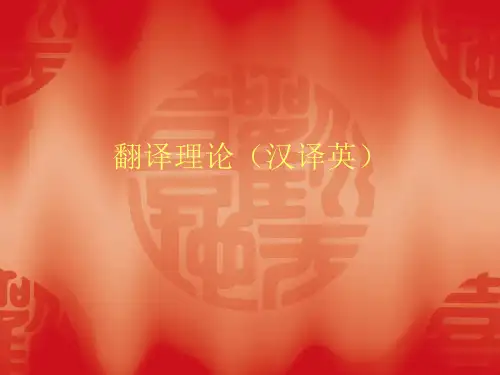
![翻译理论与实践[汉译英]3.2语境与词汇的翻译](https://uimg.taocdn.com/c6bd6d7ac281e53a5902ff51.webp)
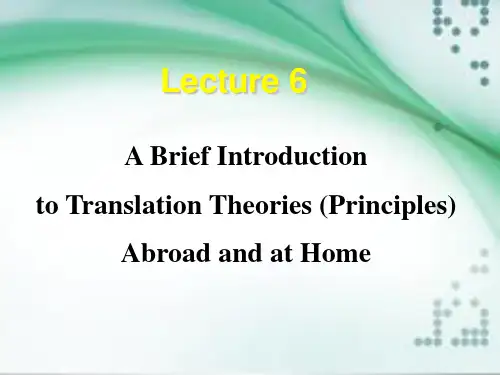
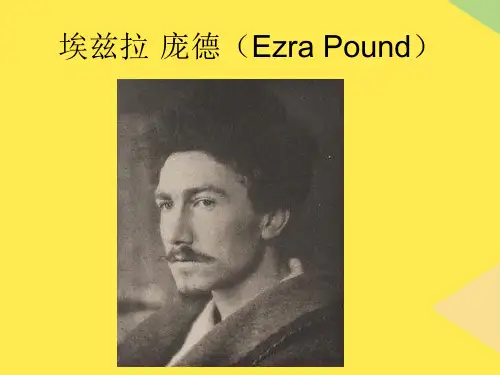
![翻译理论与实践[汉译英]4.2谓语的确定与主谓一致问题1](https://uimg.taocdn.com/7e4e375aa45177232f60a29d.webp)
![翻译理论与实践[汉译英]汉译英-词的选择](https://uimg.taocdn.com/5f557c75a8114431b90dd8cc.webp)
词的选择Ⅰ. Translate the following Chinese words and expressions into English, paying attention to the bold-faced words.1.运动a.运动有益身心b.足球是我喜欢的运动c.他在香港热心推广手球运动d.我国每年纪念五四运动e.人们热烈响应筹款运动f.他们发起了一场戒烟运动g.这属于运动神经疾病h.技术革新运动是成功的关键2. 着a.她着凉了。
b.你猜着了。
c.炉子着得很旺。
d.上不着天,下部着地。
e.老李躺下就着了。
f.他有点着慌。
g.他走错了一着。
h.屋顶上全都覆盖着积雪。
i.这些孩子穿着整齐。
j.再着一把力。
k.我们着眼于未来。
l.他们正在着手制定计划。
3. 馆博物馆、图书馆、旅馆、宾馆、大使馆、领事馆、茶馆、饭馆、理发馆、体育馆、展览馆、文化馆、美术馆、科技馆、天文馆、照相馆4. 学习a. 学习知识b. 学习技术c. 学习外语d. 学习成绩e. 学习别人的长处f. 互相学习g. 学习雷锋的榜样5. 送a. 送某人一本书b. 送礼c. 送信d. 送客e. 送行f. 送雨伞g. 送命h. 送孩子上学i. 送某人回家j. 将卫星送上天k. 送葬l. 送罪犯上法庭审判key: 1.运动a.Exercise is good for health.b.Football is my favorite sport.c.He is a keen promoter of handball in Hong kong.d.The May Fourth Movement is commemorated in our country every year.e.There was great enthusiasm for the donation drive.f.They started a campaign to stop people smoking.g.This belongs to motor nerve disease.h.Technological renovation is a key to the success.2. 着a.She was caught cold.b.You’ve guessed right.c.The fire is burning briskly in the stove.d.Be suspended in mid air.o Li fell asleep as soon as he lay down.f.He got alarmed.g.He has made a false move.h.The roofs are all covered with snow.i.These children are all neatly dressed.j.Make one more effort.k.We have our eyes on the future.l.The are starting drawing up the plan.3. 馆museum, library, hotel, guest house, embassy, consulate, tea house, restaurant, barbar’s shop, gymnasium, exhibition hall, cultural center, art gallery, science and technology center, planetarium, photo studio4. 学习a. acquire knowledgeb. master a skillc. study a foreign languaged. academic recordse. emulate others’ strong pointsf. learn from each otherg. follow the example of Lei Feng这一组中的“学习”,也是一个最常见的词语,需要结合上下文来遣词用字。
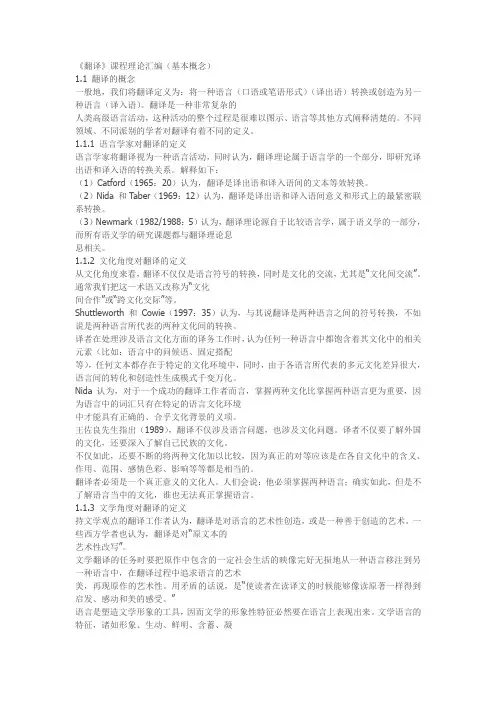
《翻译》课程理论汇编(基本概念)1.1 翻译的概念一般地,我们将翻译定义为:将一种语言(口语或笔语形式)(译出语)转换或创造为另一种语言(译入语)。
翻译是一种非常复杂的人类高级语言活动,这种活动的整个过程是很难以图示、语言等其他方式阐释清楚的。
不同领域、不同派别的学者对翻译有着不同的定义。
1.1.1 语言学家对翻译的定义语言学家将翻译视为一种语言活动,同时认为,翻译理论属于语言学的一个部分,即研究译出语和译入语的转换关系。
解释如下:(1)Catford(1965:20)认为,翻译是译出语和译入语间的文本等效转换。
(2)Nida 和Taber(1969:12)认为,翻译是译出语和译入语间意义和形式上的最紧密联系转换。
(3)Newmark(1982/1988:5)认为,翻译理论源自于比较语言学,属于语义学的一部分,而所有语义学的研究课题都与翻译理论息息相关。
1.1.2 文化角度对翻译的定义从文化角度来看,翻译不仅仅是语言符号的转换,同时是文化的交流,尤其是“文化间交流”。
通常我们把这一术语又改称为“文化间合作”或“跨文化交际”等。
Shuttleworth 和Cowie(1997:35)认为,与其说翻译是两种语言之间的符号转换,不如说是两种语言所代表的两种文化间的转换。
译者在处理涉及语言文化方面的译务工作时,认为任何一种语言中都饱含着其文化中的相关元素(比如:语言中的问候语、固定搭配等),任何文本都存在于特定的文化环境中,同时,由于各语言所代表的多元文化差异很大,语言间的转化和创造性生成模式千变万化。
Nida 认为,对于一个成功的翻译工作者而言,掌握两种文化比掌握两种语言更为重要,因为语言中的词汇只有在特定的语言文化环境中才能具有正确的、合乎文化背景的义项。
王佐良先生指出(1989),翻译不仅涉及语言问题,也涉及文化问题。
译者不仅要了解外国的文化,还要深入了解自己民族的文化。
不仅如此,还要不断的将两种文化加以比较,因为真正的对等应该是在各自文化中的含义、作用、范围、感情色彩、影响等等都是相当的。
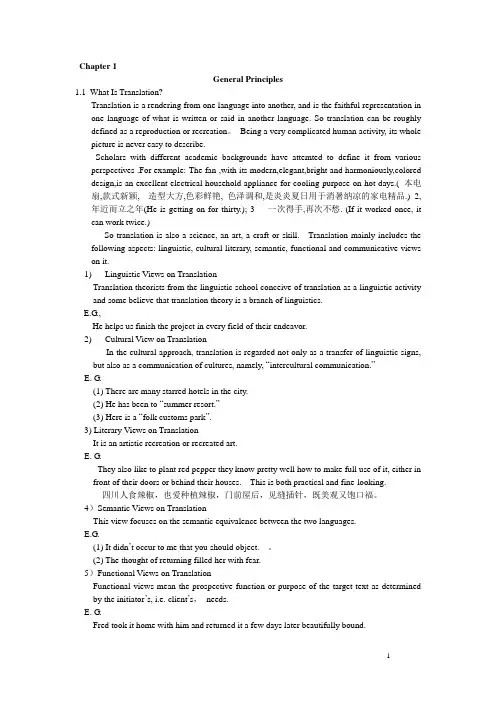
Chapter 1General Principles1.1What Is Translation?Translation is a rendering from one language into another, and is the faithful representation in one language of what is written or said in another language. So translation can be roughly defined as a reproduction or recreation。
Being a very complicated human activity, its whole picture is never easy to describe.Scholars with different academic backgrounds have attemted to define it from various perspectives .For example: The fan ,with its modern,elegant,bright and harmoniously,colored design,is an excellent electrical household appliance for cooling purpose on hot days.( 本电扇,款式新颖, 造型大方,色彩鲜艳, 色泽调和,是炎炎夏日用于消暑纳凉的家电精品.) 2,年近而立之年(He is getting on for thirty.); 3 一次得手,再次不愁. (If it worked once, it can work twice.)So translation is also a science, an art, a craft or skill. Translation mainly includes the following aspects: linguistic, cultural literary, semantic, functional and communicative views on it.1)Linguistic Views on TranslationTranslation theorists from the linguistic school conceive of translation as a linguistic activity and some believe that translation theory is a branch of linguistics.E.G.,He helps us finish the project in every field of their endeavor.2)Cultural View on TranslationIn the cultural approach, translation is regarded not only as a transfer of linguistic signs, but also as a communication of cultures, namely, “intercultural communication.”E. G.(1) There are many starred hotels in the city.(2) He has been to “summer resort.”(3) Here is a “folk customs park”.3) Literary Views on TranslationIt is an artistic recreation or recreated art.E. G.They also like to plant red pepper they know pretty well how to make full use of it, either in front of their doors or behind their houses. This is both practical and fine-looking.四川人食辣椒,也爱种植辣椒,门前屋后,见缝插针,既美观又饱口福。
翻译理论与实践2(汉译英)Translation Theories and Practice (Chinese-English Translation )Teaching Notes for Senior College Students(2005年9月)(2008年9月第3次修订)授课人:刘国忠Tel: 2578706E-mail: gzliu@前言(一)课程简介《翻译理论与实践3》为英语专业四年级学生必选课,旨在培养外向型人才,为改革开放,建设有中国特色的社会主义服务。
该课程在注重基础语言知识、基础翻译知识和基础理论学习和掌握的同时,强调基础与提高的关系,力图将本科生课程与研究生考试衔接起来,便于本科生毕业后从事翻译的相关工作或为继续深造打好基础。
(二)本课程教学在专业人才培养中的地位和作用根据我系英语专业(本科)的培养目标“培养具有坚实的英语语言基础、系统的语言理论知识和一定科研能力,能在外事、经贸、文化、新闻出版、教育、科研、旅游等部门从事翻译、研究、教学、管理工作的英语高级专门人才。
”本课程主要承担着培养学生的基本的翻译能力,在实现我系英语专业人才培养目标的进程中,起着不可替代的重要作用。
(三)本课程所要达到的基本目标使学生初步了解翻译基础理论和英、汉两种语言的异同,并掌握常用的翻译技巧,培养基本的翻译技能,能将中等难度的汉语篇章或段落译成英语。
译文忠实原文,语言通顺,速度约为每小时200—250个汉语词语。
(四)学生学习本课程应掌握的方法与技能学生翻译技能的培养应包括以下五个方面:语言分析和运用能力;文化辨析和表现能力;审美判断和表现能力;双向转换和表达能力以及逻辑分析和校正能力。
素质教育的一个显著特点就是要使教育者能主动地学习、主动地发展,在课堂教学中就是要充分体现学生的主体地位,让学生积极地参与知识的获得过程。
要让学生明白翻译课是一门实践性很强的课程,强调自身的翻译实践在培养翻译能力过程中的重要性,没有足够量的翻译实践,翻译能力的培养将是一句空话。
翻译理论与实践1(英译汉)实战练习15篇1.The Policy of Mass Media1) Life is indeed full of problems on which we have to make decisions as citizens or as private individual.2) But neither the real difficulty of these decisions nor their true and disturbing challenge to each individual can often be communicated through the mass media.3) The disinclination to suggest real choice which is to be found in the mass media is not simply the product of a commercial desire to keep the customers happy.4) The organs of the Establishment however well—intentioned they may be have a vested interest in ensuring that the public boat is not violently rocked and will so affect those who work within the mass media that they will be led insensibly towards forms of production which though they go through the motions of dispute and inquiry do not break through the skin to where such inquires might really hurt.5) They will tend to move when exposing problems well within the accepted cliché—assumptions of democratic society and will tend neither radically to question these clichés nor to make a disturbing application of them to features of contemporary life2. The American and the English1) Of the intrinsic differences that separate American from English the chief have their roots inthe obvious disparity between the environment and traditions of the American people since the seventeenth century and those of the English.2) The latter have lived under a relatively stable social order and it has impressed upon their souls their characteristic respect for what is customary and of good report.3) Until the World War brought chaos to most of their institutions their whole lives were regulated perhaps more than those of any other people save the Spaniards by a regard for precedent.4) The Americans though partly of the same blood have felt no such restrain and acquired no such habit of conformity.5) On the contrary they have plunged to the other extreme for the conditions of life in their country have put a high value upon the precisely opposite qualities of curiosity and daring and so they acquired that character of restlessness that impatience of forms that disdain of the dead hand which now broadly marks them.3. The Education of Humanists1)The education of humanists cannot be regarded as complete or even adequate without exposure in some depth to where things stand in the various branches of science particularly in the areas of our ignorance.2)Physics professors most of them look with revulsion on assignments to teach their subjects to poets.3) The liberal arts faculties for their parts will continue to view the scientists with suspicion and apprehension. 4) But maybe a new set of courses dealing systematically with ignorance in science will take hold.5) The scientists might discover in it a new and subversive technique for catching the attention of students driven by curiosity delighted and surprised to learn that science is exactly as some scientists described it: an “endless frontier.”6) The humanists for their part might take considerable satisfaction in watching their scientific colleagues confess openly to not knowing everything about everyone.7) And the poets on whose shoulders the future rests might late nights thinking things over begin to see some meanings that elude the rest of us.4. . American Study1) The scientific interest of American history centered in national character and in the workings of a society destined to become bast in which individuals were imp0rtant chiefly as types.2) Although this kind of interest was different from that of European history it was at least as important to the world.3) Should history ever become a true science it must expect to establish its laws not from the complicated story of rival European nationalities but from the economical evolution of a great democracy.4) North America was the most favorable field on the globe for the spread of a society so large uniform and isolated as to answer the purposes of science.5) There a single homogeneous society could easily attain proportions of three or four hundred million persons under conditions of undisturbed growth.6) In Europe or Asia undisturbed social evolution had been unknown.7) Without disturbance evolution seemed to cease.8) Wherever disturbance occurred permanence was impossible.9) Every people in turn adapted itself to the law of necessity.5. Jack London1) Life itself led London to reject this approach in his writing.2) He knew what it meant to be one of the disinheritedto be chained to the deadening routine of the machine and to soul-destroying labor for an insufficient reward.3) Consequently he swept aside not only the literature that pretended that ours is a society of sweetness and light but also that which contended that the inculcation of the spirit of Christian fellowship would put an end to class controversy.4) He did not oppose labor organization nor balk at the strike as a weapon of labor; rather he took his heroes and heroines from the labor movement and wove his plots within their struggles.5) He poured into his writings all the pain of his life the fierce hatred of the bourgeoisie that it had produced in him and the conviction it had brought to him that world could be made a better place to live in if the exploited would rise up and take the management of society out of the hands of the exploiters.6. President Carter1) President Carter has been calling his closest advisers together for what is called as a hard reappraisal of his administration’s troubles but who will tell him the truth? 2) You can almost put it down as a general rule in this town that presidents often invite “honest criticism” from their aides but seldom get it and usually don’t follow it when they do.3) The reasons for this are not obscure.4) The Oval Office is the most frightening room inAmerica.5) It imposes a kind of respect on most visitors and even those legislative lions who roar against the president on Capital Hill tend to usually lower their voices and follow their prepared speeches when they walk through the White House door.6) Few While House aides dare to say anything against the president without betraying their fears.7) Even Henry Kissinger who is not an excessively modest or silent man hesitated to face President Nixon with the disaster he knew lay ahead.7.On “Mein Kampf”1) Mein Kampf’s the me song recurring again and again is race race purity race supremacy though nowhere did Hitler attempt to define race.2) It was never intended by Nature Hitler claims that all races should be equal any more than individuals are equal.3) Some are created superior to others.4) The Germans as the world’s strongest race should rule over the inferior through having the habitat of the highest race extended and scattered Germanic peoples united under one rule.6) The vast expansion visualized by Hitler would take place principally at the expense of other races.7) To attain the objectives set by his soaring ambition Hitler proposes three methods: propaganda diplomacy and force. 8) Nowhere in Mein Kampf is the author more revealing of himself and his tactics than in his discussionof propaganda techniques—correctly believed by him to be one of the Nazis’ most effective and formidable weapons.8. How to Write Clearly1) I have never had much patience with the writers who claim from the reader an effort to understand their meaning.2) You have only to go to great philosophers to see that it is possible to express with lucidity the most subtle reflections.3) One cause of obscurity is that many writers think not before but as they write.4) The pen originates the thought.5) The disadvantages of this and indeed it is a danger against which the author must be always on his guard is that there is a sort of magic in the written word.6) The idea acquires substance by taking on a visible nature and then stands in the way of its own clarification.7) But this sort of obscurity merges very easily into the willful.8) Some writers who do not think clearly are inclined to suppose that their thoughts have a significance greater than at first sight appears.9) It is flattering to believe that they are too profound to be expressed so clearly that all who run may read and very naturally it does not occur to such writers that the fault is with their own minds which have not the faculty of precise reis with their own minds which have not the faculty of precise reflection.9. 1) Of course there is a strong element of luck in both success and failure but it is my belief that there are no “secrets” to success.2) One thing I have discovered is that attitudes and values that I acquired in China long before came to the United States have had a great bearing on the success in my business.3) These values have much in common with some of the virtues of Confucianism the Chinese philosophy that stresses moderation.4) However although I respect the spirit of Confucianism I have not tried to adapt this ancient Chinese philosophy to modern society.5) For besides moderation other things I have found to be essential to success are patience adaptability decisiveness confidence unconventional thinking social responsibility and last luck.6) The importance of these attributes is in their interaction.7) Some of them are antithetical to others—patience will often collide with decisiveness for instance—and yet it is hard to think of any of my decisions in which they did not play a role.10. Tragedy1) Our tragedy today is a general and universal physical fearso long sustained by now that we can even bear it.2) There are no longer problems of the spirit.3) There is only the question:4) When will I be blown up? 5) Because of this the young man or woman writing today has forgotten the problems of the human heart in conflict with itself which alone can make good writing because only that is worth writing about worth the agony and the sweat.6) He must learn them again.7) He must teach himself that the basest of all things is to be afraid; and teaching himself that forget it forever leaving no room in his workshop for anything but the old verities and truths of the heart the universal truths lacking which any story is ephemeral and doomed—love and honor and pity and pride and compassion and sacrifice.8) Until he does so he labors under a curse.9) He writes not of love but of lust of defeats in which nobody loses anything of value of victories without hope and worst of all without pity or compassion.11. The Choice of Life1) The lives of most men are determined by their environment.2) They accept the circumstances amid which fate has thrown them not only with resignation but even with goodwill.3) They are like streetcars running contentedly on their rails and they despise the motorcycle that dashes in and out of the traffic and speeds so jauntily across the open country.4) I respect them; they are good citizens good husbands and good fathers and of course somebody has to pay the taxes; but I don’t find them exciting.5) I am fascinated by the men few enough in all conscience who take life in their own hands and seem to mould it to their own liking.6) It may be that we have no such thing as free will but at all events we gave the illusion of it.7) At a cross-road it does seem to us that we might go either to the right or the left and the choice once made it is difficult to see that whole course of the world’s history obliged us to take the turning we did.12. Science Fiction1) Moreover if SF is the laboratory of the imagination its experiments are often of the kind that may significantly alter the subject matter even as they are being carried out.2) That is SF has always had a certain feedback effect on society as its visions emotionally engage the future consciousness of the mass public regarding especially desirable and undesirable possibilities.3) The shape a society takes in the present is in part influenced byits image of the future.4) For that matter some individuals in recent years have even shaped their own life-style after appealing models provided by SF stories.5) The diffusion of SF futuristic images of alternative societies through the media of movies and television may have speeded up and augmented SF’s social feed back effects.6) Thus SF is not only change speculator but change agent sending an echo from the future that is becoming into the present that is sculpting it.7) This fact alone makes imperative in any education system the study of the kinds of works discussed here.13. 1) Since the 1970s the Chinese community in the USA has undergone tremendous changes among which is its rapid increase in population as many Chinese have kept flooding into America’s shore.3) As the population of the American citize ns of Chinese descent has increased and their qualities have evidently improved so their economic conditions have prospered.4) It is said that since 1986 the US citizens of Chinese descent have leapt to a good lead over other racial minorities Japanese and Koreans for instance.5) The average Chinese family’s yearly income has now come to exceed that of the average American family.6) At present there is a number ofenterprisers of Chinese descent in the economic circles in the US who enjoy considerable fame.7) An even more cheerful phenomenon is that in recent years there have sprung up in the US prominent scientific and technical talents of Chinese descent.8) Their achievements have come to command the notice and admiration of scientists and technical experts in the world.9) Meanwhile Chinese-descent citizens have roles to play in American political circles as they have risen evidently in political status.14. Attitudes towards retirement vary from person to person.2) Some people think that they will enjoy their time in retirement, 3) but when it comes they may feel a little disappointed.4) Unwilling to resign themselves to the prospect of being put on the scrap heap they try to seek alternative outlets for their energies and alternative sources of income that employment can provede.5) Others have already prepared themselves for the significant change in their lives.6) Tired out after all exhausting life revolving around work they are anxious to relax in retirement with all the strains relieved.7) As there is no more need to rush to catch a morning bus and no more anxiety about promotion they now have enough time to fulfill an old dreamsuch as writing painting growing flowers and traveling around.8) On the whole female workers tend to have a more favorable attitude towards retirement than male workers.9) Withdrawal from employment to complete domesticity is a far less threatening experience for a woman than for a man.15. Mr. Zhang a retired miner bought four chicks early this yeae.2) One day he found one of them missing.2) He got so angry that he kept blaming his wife for it all the time.3) Towards evening into his yard came a chick followed by his neighbor Wang who ran to catch the chick.4) Naturally Zhang’s wife wouldn’t let him go with the chick.5) and so a quarrel ensued.6) It turned out that Wang had also lost one of his two chicks recently which he bought nearly the same time as Mr Zhang did.7) Their quarrel drew another neighbor Lee to the yard to see what was happening.8) Having heard the story he put the chick somewhere between their homes and let it off.9) The chick went straight to join Zhang’s flock and kept returning whenever it was driven to Wang’s home.10) And at Zhang’s call “Chick chick” all the chicks including the one in question recede in response to him.11) Wang had no more to say but made an immediate apologize. Thus ended the quarrel over a chick.。
Literal Translation(直译)and Liberal / Free Translation(意译)Warming-up: Translation Improvement1. She is in love with him.2. Commit no nuisance.3. I found myself at the foot of a hill.4. 岂有此理。
5. 他这人从来不管什么三七二十一。
她和他在爱中。
不要犯讨厌。
我在一座小山的山脚发现了自己。
There is no such principle. He never cares that three times seven equals to twenty-one.I. Literal TranslationThe so-called literal translation, superficially speaking, means “not to alter the original words and sentences”;strictly speaking, it strives “to keep the sentiments and style of the original”.crocodile’s tears(鳄鱼的眼泪)armed to the teeth(武装到牙齿)gentlemen’s agreement(君子协定)Smashing a mirror is no way to make an ugly person beautiful, nor it is a way to make social problem evaporate.⏹Literal: 砸镜子不能使丑八怪变漂亮,也不能使社会问题烟消云散.⏹Free: 砸镜子不能解决实际问题II. Liberal / Free Translation⏹an alternative approach used mainly to convey the meaning and spirit of the original without trying to reproduce its sentence patterns or figures of speech.⏹Free translation is more “TL-oriented” than literal translation.⏹at sixes and sevens 乱七八糟It rains cats and dogs滂沱大雨⏹Don’t cross the bridge till you get to it. 不必自寻烦恼;不要自找麻烦。